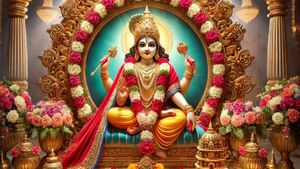The recently released film 'Mrs,' starring Sanya Malhotra, is making waves for its contemplative narrative on patriarchy, expertly tapping emotions similar to those portrayed in the acclaimed Malayalam original, 'The Great Indian Kitchen.' This Hindi adaptation, available on Zee5, explores the life of Richa, played by Malhotra, as she strives to balance the conflicting demands of her marriage and her aspirations as a dancer.
For those unfamiliar with the Malayalam original, 'Mrs' delivers fresh yet familiar content wrapped around significant messages about the women's experience within domestic boundaries. Richa enters her marital home excited and lively but soon finds herself trapped within the confinement of traditional roles expected of her. Her dreams of dancing begin to fade as duties like cooking and cleaning monopolize her time.
Director Aarti Kadav's adaptation maintains the same story beats as Jeo Baby's original but introduces subtle alterations, such as shifting the profession of Richa’s husband, Diwakar, from being merely unemployed to a gynaecologist—a choice demonstrating layers of hypocrisy and ridicule surrounding gender expectations. Sanya Malhotra shines as Richa, showcasing her character's evolution on this turbulent path. Viewers witness the impact of unmet dreams and societal pressures through her heartfelt performance.
Critics are divided on the film’s reception, with some praising Malhotra’s performance, describing her portrayal as genuine and relatable. A viewer noted, "While it stars my favourite actress of the era: Sanya Malhotra, Mrs. on Zee5 does not come close to the original Malayalam movie The Great Indian Kitchen." Others were more enthusiastic, applauding the film for its solid structure and various moments of resonance, saying, "Sanya Malhotra is terrific in her scathingly powerful attack on patriarchy. She's excellent. You just want to protect Richa from the world." This duality of reception appears common, representing both hope and disappointment within film adaptations.
The emotional turmoil Richa experiences not only unravels her aspirations but highlights the systemic nature of internalized oppression, placing viewers face-to-face with uncomfortable realities. A significant scene depicts her resistance to being treated as merely an object for domestic chores, sparking authentic dialogue on consent and emotional labor. One moment poignantly shows Richa explaining to another girl, "A woman is like an undivided primary number, and that's her secret power.” It showcases her determination to share wisdom amid trying circumstances.
What sets 'Mrs' apart, even from its predecessor, is Kadav’s deliberate focus on modernity intertwined with tradition. The cinematography introduces visually appealing yet hauntingly captivating shots of domestic spaces, spotlighting the agony beneath polished representations of Indian womanhood. “The kitchen looks modern, but the drudgery remains constant,” points one review, showcasing the film’s critique of superficial progress against deeply ingrained values.
Nevertheless, there are areas where 'Mrs' falters. Critics have noted the film's reliance on dialogue at times; it sometimes dilutes impactful moments when the Rajnikanth element could have prevailed—subtlety and silence. The narrative could benefit from additional depth, allowing the characters to humanely resonate rather than feeling like vehicles for broader social commentary. This lack of nuance raises the unfortunate question about whether 'Mrs' can stand on its own beyond 'The Great Indian Kitchen.' For some, it does represent significant discussions around women's independence, but for critics, it remains more prescriptive than nuanced.
Despite the critiques, 'Mrs' is undeniably destined to ignite conversations around feminism and societal expectations, particularly among couples. The film functions as both therapy and cautionary tale, reminding audiences of the classic struggles women face, often hidden behind closed doors.
With strong performances, particularly from Malhotra, Nishant Dahiya, who plays her husband, and Kanwaljit Singh as her father-in-law, the film reverberates with collective experiences. Malhotra successfully conveys her disillusionment as the narrative progresses; at first, hope brazenly dances on the screen, only to be replaced by resignation. The heart-wrenching tenor of relating to Richa’s plight is compelling, echoing the struggles across countless households.
Reflective of societies globally, the struggle is real, and 'Mrs' serves as testimony. Despite its shortcomings, it is undoubtedly significant cinema embedded with layers of realism. By reflecting these experiences, the creators have succeeded: 'Mrs' is more than just storytelling; it urges audiences to confront patriarchal norms, making it both recommended viewing for couples and individuals alike.



